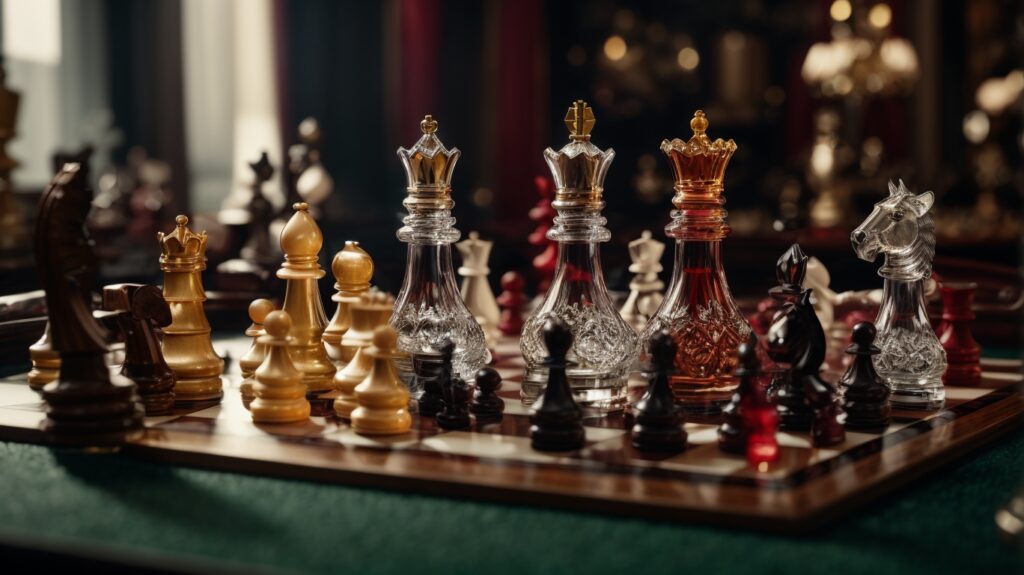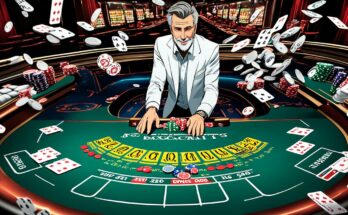Are you a fan of strategic games and wondering which one to indulge in next? Look no further! In this article, we will compare Baccarat and Chess, two popular games that, at first glance, may seem worlds apart. However, upon closer inspection, you’ll discover that these games share striking similarities in terms of strategy and decision-making.
Overview of Baccarat and Chess as strategic games
Baccarat and Chess are both strategic games that require critical thinking and planning. Here’s a rundown of each game’s key features:
Baccarat: Baccarat is a card game that originated in Italy but gained popularity in France during the 19th century. It is a simple yet elegant game that pits the player against the banker. The objective is to have a hand value as close to nine as possible. Players must decide whether to bet on the player’s hand, the banker’s hand, or a tie.
Chess: Chess is one of the oldest known board games that originated in India around the 6th century. It is played on a checkered board with 64 squares and involves two players, each controlling an army of pieces. The goal is strategically outmaneuvering and capturing the opponent’s king without sacrificing your own. Chess requires deep thinking, planning several moves ahead, and analyzing different possibilities.
Despite the differences in their gameplay, Baccarat and Chess share several strategic similarities. Both games require players to anticipate their opponent’s moves, evaluate risks, and make decisions based on limited information. Strategic planning, foresight, and adaptability are crucial in achieving success in both games.
In conclusion, while Baccarat and Chess may appear to be vastly different games, they both offer players the opportunity to engage in strategic thinking and decision-making. So, whether you prefer the thrill of the cards or the intellectual challenge of the board, both Baccarat and Chess are excellent choices for those seeking a strategic gaming experience.
Baccarat vs. Chess: Unveiling the Strategic Similarities
When it comes to strategic thinking and decision-making, two very different games come to mind: Baccarat and Chess. On the surface, these games may seem worlds apart, but upon closer inspection, surprising similarities reveal the strategic mindset required to excel in both. Let’s explore the strategic elements of Baccarat and Chess.
Baccarat: The Basics
Baccarat is a popular card game that is played in casinos around the world. The game revolves around the Player hand and the Banker hand. The goal is to predict which hand, either the Player or the Banker, will have a total value closest to nine. Players can also bet on a tie.
Rules and Gameplay of Baccarat
In Baccarat, the rules are straightforward to understand. Each hand is dealt two cards, and additional cards may be drawn based on predetermined rules. The total value of the cards is calculated by adding up their individual values. Picture cards (such as Kings, Queens, and Jacks) and tens have zero value, while other cards retain their face value. The highest possible hand value is nine.
Understanding the odds of winning in Baccarat
While Baccarat may seem like a game of chance, strategic elements can influence the odds of winning. Players can employ strategies to manage their bets and make calculated decisions based on the outcome of previous hands. Understanding the odds and probabilities can help players make informed choices in their gameplay.
By comparing the strategic similarities of Baccarat and Chess, we can see that both games require critical thinking, analysis, and the ability to make calculated moves. Both games also involve a level of risk assessment and decision-making under pressure. So, whether you prefer the intellectual challenge of Chess or the excitement of Baccarat, both games offer an opportunity to showcase your strategic prowess.

Chess: The Basics
Chess is a timeless game that has captivated players for centuries. It’s a game of strategy and skill, where players must outwit and outmaneuver their opponents to achieve victory. While it may seem unrelated, there are surprising similarities between chess and another game of strategy – Baccarat.
Rules and Gameplay of Chess
In chess, two players go head-to-head on a square board with 64 alternating light and dark-colored squares. Each player starts with 16 pieces, including a king, a queen, bishops, knights, rooks, and pawns. The objective is to checkmate the opponent’s king, which means putting it in a position where it cannot escape capture. Each piece makes moves in a predetermined manner, and players must think several moves ahead to anticipate their opponent’s reactions.
If you’re eager to master the game of kings and queens, dive into our comprehensive guide on how to play chess to start your journey today.
The importance of strategy and planning in Chess
Just like in chess, strategy and planning play a crucial role in Baccarat. This card game aims to have a hand total as close to 9 as possible. Players and the banker are dealt two or three cards each, and the values of the cards are added together. The player or banker with the closest hand value to 9 wins. However, players must decide whether to draw a third card or stand based on intricate rules.
The parallel between chess and Baccarat lies in the need for strategic thinking and planning. In both games, players must carefully analyze the current situation, anticipate the opponent’s moves or decisions, and plan their own moves accordingly. A successful player in both games understands the importance of patience, foresight, and adaptability.
Overall, while chess and Baccarat may seem like vastly different games, they share underlying similarities in strategic thinking, planning, and anticipating the opponent’s moves. So whether you prefer moving pieces on a chessboard or playing cards, these two games offer a thrilling challenge for fans of strategy and skill.
Strategic Similarities
Analyzing the strategic elements in Baccarat and Chess
Baccarat and Chess may seem like two completely different games at first glance, but upon closer examination, it becomes clear that they share some surprising strategic similarities. Both games require players to think several moves ahead and make strategic decisions based on the current situation. Here’s a closer look at how the strategic elements in Baccarat and Chess align.
In Baccarat, players have to make decisions based on the value of their cards and the probability of success. They must analyze the situation, consider the odds, and decide whether to draw another card or stand pat. This decision-making process is similar to the strategic thinking required in Chess. In Chess, players must evaluate their pieces’ positions and anticipate their opponent’s moves. They then need to formulate a plan to outmaneuver their opponent and achieve victory. The strategic element of planning ahead is essential in both games.
Applying strategic thinking in Baccarat and Chess
Strategic thinking is critical in Baccarat and Chess and can also be applied to various real-life situations. Both games teach players the importance of analyzing information, evaluating options, and making calculated decisions. Thinking strategically can benefit entrepreneurs, business leaders, and individuals in decision-making processes. It helps them consider different scenarios, assess risks, and make informed choices that can lead to success.
In conclusion, Baccarat and Chess may seem like different games on the surface, but they share strategic elements that require players to think ahead and make calculated decisions. The ability to analyze information, evaluate options, and make strategic choices is essential in both games. Whether playing Baccarat or Chess or applying strategic thinking in real-life situations, the skills you develop can help you navigate challenges and achieve your desired outcomes.
Differences Between Baccarat and Chess

Contrasting elements in Baccarat and Chess
Regarding strategic games, Baccarat and Chess are undoubtedly two of the most well-known examples. However, they differ significantly in various aspects.
Baccarat is a card game that relies heavily on chance and luck. Players make decisions based on the cards dealt to them without much control over the outcome. In contrast, Chess is a board game that requires skill and strategic thinking to outmaneuver the opponent. Each piece on the board has its own unique abilities, and players must anticipate their opponent’s moves to plan their strategy accordingly.
Another key difference lies in the complexity of the games. Baccarat is relatively straightforward, with simple rules that can be learned quickly. However, Chess has a vast array of possible moves and strategies, making it a more challenging and intellectually stimulating game. Mastering Chess requires years of practice and an in-depth understanding of various tactics and openings.
The role of luck in Baccarat and the absence of luck in Chess
Luck plays a significant role in Baccarat, as players must rely on the cards they are dealt to win. A fortunate draw can turn the game in their favor, regardless of their strategic decisions. This element of chance adds excitement and unpredictability to the game, making it appealing to those seeking a more relaxing and casual gaming experience.
On the other hand, Chess is a game purely based on skill and strategy. No element of luck is involved, as players have complete control over their moves and the game’s outcome. This makes Chess a highly competitive and mentally demanding game, where players must think several moves ahead and anticipate their opponent’s strategies.
In conclusion, while both Baccarat and Chess are strategic games, they differ significantly in terms of their reliance on luck and complexity. Baccarat offers a chance-based experience suitable for casual gamers, while Chess provides a challenging and skill-based competition for those seeking more intellectually stimulating gameplay. So whether you prefer the roll of the dice or the mastery of the mind, there’s a strategic game out there for everyone.
How does online gameplay of Baccarat compare to traditional gameplay in terms of strategic similarities to Chess?
When comparing traditional and online baccarat, strategic similarities to chess become evident. Both games require players to make calculated decisions based on limited information. In both, skilled players can anticipate their opponent’s moves and adjust their own strategies accordingly, making for a more engaging and mentally stimulating experience.
Unveiling the strategic similarities between Baccarat and Chess
In the world of gaming, strategic thinking is a prized skill that separates the masters from the novices. While Baccarat and Chess may seem completely different, they share some surprising strategic similarities.
Appreciating the strategic aspects of both games
- Decision-making: Both Baccarat and Chess require players to make strategic decisions throughout the game. In Baccarat, players must analyze the odds and decide whether to bet on the player, the banker, or a tie. Similarly, in Chess, players must carefully consider every move, anticipate their opponent’s responses, and make decisions that will ultimately lead to victory.
- Risk assessment: Both games involve a certain level of risk assessment. In Baccarat, players must evaluate the risks associated with different bets and manage their bankroll accordingly. In Chess, players must assess the risks and rewards of each move, considering the potential consequences and weighing them against the desired outcome.
- Pattern recognition: Both Baccarat and Chess require players to recognize patterns and adjust their strategies accordingly. In Baccarat, players often rely on patterns in the previous outcomes to inform their bets. In Chess, players must recognize patterns in their opponent’s moves and adapt their strategy to counter them.
- Long-term planning: Both games require players to think several steps ahead and plan their moves accordingly. In Baccarat, players must consider the long-term implications of their betting strategies. In Chess, players must anticipate their opponent’s future moves and plan their own moves to set them up for success.
While the objectives and mechanics of Baccarat and Chess are undoubtedly different, their strategic components are remarkably similar. Both games require players to think strategically, make informed decisions, assess risks, recognize patterns, and plan for the long term.
In conclusion, Baccarat and Chess may occupy different realms in the gaming world, but their shared strategic elements make them both engaging and mentally stimulating. Whether you prefer the thrill of the casino or the intellectual challenge of Chess, honing your strategic thinking skills in either game can undoubtedly enhance your overall cognitive abilities. So, why not give them both a try?




